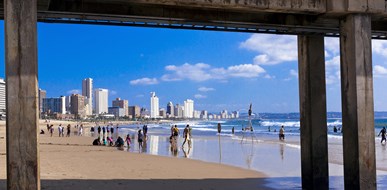United Cities and Local Governments World Summit and its meaning for the interaction of cities with international law and governance
Published 4 November 2019By Miha Marcenko

© Shutterstock
From the 11th to 15th of November I will be visiting the United Cities and Local Governments World Congress of cities in Durban, South Africa promoted as ‘the largest gathering of mayors, presidents of associations, councillors, and local and regional practitioners from around the world.’ This blog is meant to give some context to the event and show what its significance is for the interaction between cities and international law and governance.
United Cities and Local Governments
The event is organised by United Cities and Local Governments (UCLG), the largest intercity organization in the world representing local and regional authorities from all continents and regions. Its ambition is to be seen as the main global network through which mayors and other local public officials can interact and learn from each other.
UCLG also presents itself as the voice of the urban, local, and regional governance at the international level. Since its operation is not dependent on any central-state authority UCLG sees itself as a direct interlocutor between the local and the international levels of governance. It does this by participating at the United Nations (UN) sponsored events and wholeheartedly adopting the UN Sustainable Development Goals and UN Habitat’s New Urban Agenda. Through showing the commitment for UN agenda, UCLG expresses a demand for the voices of cities to be heard at the international level. At the same time, it tries to present local and regional authorities as crucial parts in the multilevel governance of the future.
World Summit and showing strength on the inside…
UCLG is a democratically functioning organization in which the leadership is elected in a two-step process. Its General Assembly of members elects a body called the World Council which in turn elects two executive bodies, the Executive Bureau and the Presidency. All of this happens at the UCLG's World Congress, which is part of the World Summit that I will visit in Durban.
By gathering the local leaders, and electing new leadership, UCLG will secure a mandate to continue managing this vast network of local and regional authorities. Members of UCLG, no matter from which small town they come, will get a sense that their voice has some significance in this organization with global ambitions.
Equally relevant, through the participation of its membership, UCLG will get a confirmation that its international agenda and policy choices are headed in the right direction. In recent years, the promotion of the Right to the City as well as the localization of Sustainable Development Goals have been UCLG’s international priorities. This will most certainly remain at the centre of UCLG’s international agenda in the future.
The UCLG's ambitions, however, are even higher than that. When the organisation participates in international fora it claims to speak in the name of cities and all their inhabitants and not just in the name of local authorities. To strengthen such claims to representability, UCLG has invited the civil society to the World Summit to participate in the development of its international agenda.
… as well as on the outside
In addition to securing a mandate from the constituency to represent cities, regions and local communities, the World Summit also has a function of showing the strength and the potential of UCLG to the outside world. By having such a large meeting, UCLG is creating visibility for the vibrant political dynamic of local and regional leaders gathering under its umbrella. Also, the World Summit shows that cities are capable of developing a united voice that should not be ignored by the international community.
By democratically electing its leadership and getting confirmation of its political agenda, UCLG shows the authority and willingness to carry further the banner of progressive political agenda developed at the UN. It presents itself to be a reliable and willing partner that can bring progress to the UN Agenda 2030 for Sustainable Development and should, therefore, be included in any conversation.
The World Summit is an event that at first sight has very little relevance to international law. The local leaders gathered there represent organisations, which are just part of states. They gather to develop an agenda within an organisation that exerts a soft influence on international discussions. Yet, at this summit, a developing international political voice and thus a sign of evolving subjecthood of local, municipal and regional authorities is at its full display. Through UCLG they are demanding for cities and regions to take their rightful place at the head of a new international agenda for inclusive and sustainable development.
The soft influence of UCLG is the most concrete thing that representatives of local and regional authorities have on the international level. For them, the World Summit is a very serious event. And they are more and more determined to convince the wider international community to take them seriously as well. That is why I am excited to attend the Summit and immerse myself in the conversations.

